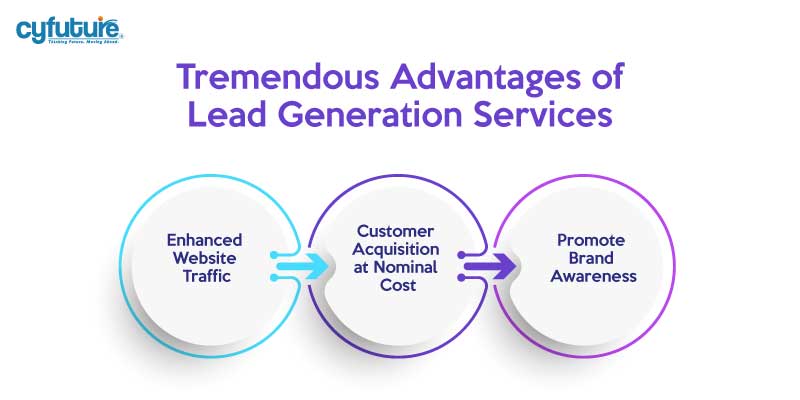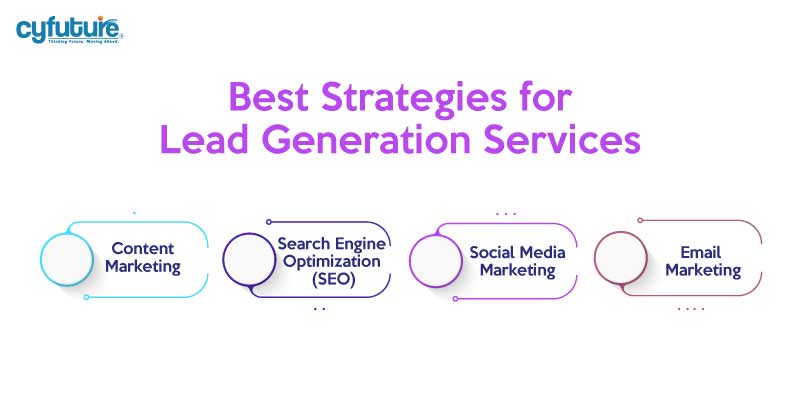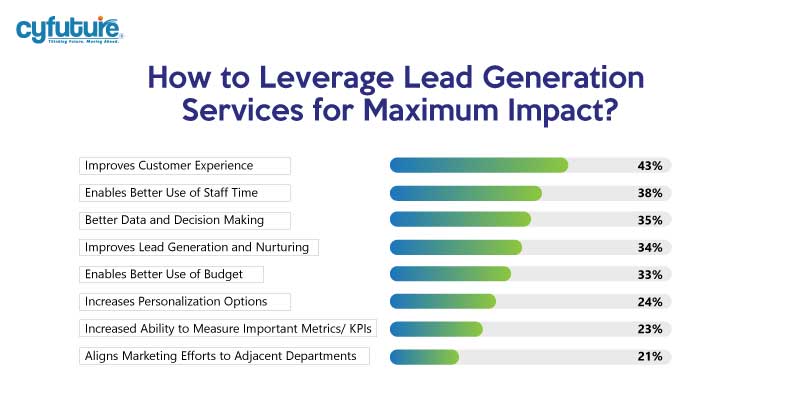-
Get Cloud GPU Server - Register Now!
Toggle navigation

According to HubSpot, lead generation is ranked as the top marketing campaign by 50% of marketers.
In business development, lead generation services are the most crucial factor. Since no one will buy your product or service regardless of how amazing it is if no one knows about it, lead generation services are a crucial part of every business. Although, it’s especially hard for small businesses. This is because, when funds are limited, it might be difficult to attract and win over new customers. However, with the right strategies and resources, small businesses, on the other hand, may effectively generate leads and spur expansion.
Moreover, it takes more than merely gathering leads and giving them to your sales team to generate leads. The right channels must be used to provide high-quality incoming and outbound leads to build relationships.
However, let’s take a look into a few stats and data before delving deep.
Now, let’s discuss some of the top lead generation tactics for small businesses and offer advice on how to get the most out of them in this comprehensive blog piece.
The practice of actively seeking out and turning interested customers into leads—that is, those who are considering using your product or service—is known as lead generation. Furthermore, it drives growth and boosts revenue in every business.
Well, there are two categories of lead generation services: inbound and outbound.
Sending messages to a target audience without first determining whether or not they have expressed interest is known as outbound lead generation services. Some marketers refer to their approach as outbound marketing. The following channels are used to carry out this:
An inbound lead is any prospect or lead that contacts you as a result of your marketing efforts. Their actions demonstrate their interest:
|
Have you heard?
Marketers of today are aware that one of the best ways to produce inbound leads is through content creation. In the case of B2B marketing, that may be even more accurate. Compared to only 60% of B2C marketers, 85% of B2B marketers utilize content to create leads. |

The following are some of the factors that make lead generation services so important for small businesses:
Two lead-generating strategies might help you get more people to your website: SEO and content marketing. This helps to improve the search engine ranking of your website in addition to increasing the possibility that visitors will become leads.
Compared to typical marketing strategies, lead generation is a more economical way to get new customers. Small businesses may reach potential customers without going over budget by concentrating on specific audiences and messaging.
Establishing brand recognition is facilitated by lead creation as well. Through consistent production of valuable content and active engagement, small businesses become recognized as thought leaders in their industry and gain the confidence of prospective clients.

This is a look at some of the best strategies small businesses may use to attract and close deals with potential customers.
Creating and distributing content that is consistent, valuable, and relevant is the process of material marketing, which aims to draw in and keep a certain audience. This covers a wide range of traditional and digital marketing techniques, including social media, newsletters, blog posts, podcasts, videos, and blogs.
Content marketing is a part of any successful marketing strategy, regardless of the stage of the sales funnel. increasing brand awareness, gaining the trust and loyalty of customers, and increasing organic traffic through SEO best practices.
Have you heard?
|
Content marketing is a great way for small businesses to build their brand, draw in new customers, and establish thought leadership. Across the sales funnel, you can draw in and nurture leads by creating excellent content that speaks to the interests and pain areas of your target audience.
Your lead generation efforts will benefit greatly from SEO as it enables you to drive large volumes of visitors to the top of your lead generation funnel.
Optimizing your website and content to improve its ranking on search engine results pages is known as search engine optimization or SEO. Your website may receive more organic traffic and a greater conversion rate from visitors who become leads if you rank higher. Small businesses may compete with larger companies by using SEO as a low-cost technique to attract potential customers. You may get more exposure for your website and obtain highly qualified leads by concentrating on long-tail keywords and optimizing them for local searches.
Social media is a great place to find leads because it’s widely used. The technique of using social media platforms to engage with potential customers and promote your goods or services is known as social media marketing. Social media, which has billions of active users, is a great tool for small businesses to generate leads and reach a large audience.
Through the creation of interesting content, the placement of targeted advertisements, and audience interaction, you may draw in and guide potential customers to your website. Additionally, social media facilitates direct communication with prospective consumers, which makes it easier to nurture leads and convert them into paying customers. Besides, it’s a great place to have competitions and maybe trade access to materials.
The technique of guiding prospective customers along the sales funnel using tailored emails is known as email marketing. With an average ROI of 42:1, this strategy is quite successful in generating leads. While other sectors reported far higher open rates, Mailchimp found that 22.71% of marketing emails were opened.
For small businesses looking to connect with new customers and maintain brand engagement, email marketing is an inexpensive strategy. Your prospects’ likelihood of becoming customers may be increased by nurturing them with material that is specifically tailored to them and by segmenting your email list.
The capacity to track is another benefit of email marketing for businesses. You can get useful data from an effective CRM, such as open rate, engagement time, and subscriber retention. You may use this information to better your efforts.
Small businesses may also leverage technology to enhance their lead generation service endeavors in addition to these strategies. The following tools can be of assistance:
HubSpot and Marketo are two examples of lead generating tools that may help small organizations automate and streamline their lead production requirements. Through the use of these technologies, you may collect leads, monitor their online activities, and assist them in moving through the sales funnel.
The program uses a range of tools and techniques, including lead magnets, landing pages, and lead capture forms, to get vital contact information from prospective customers, opening the door for effective marketing and sales efforts.
Using lead generation software has several benefits, such as increased output, higher conversion rates, and more enduring customer relationships.
Higher Conversion Rates: By obtaining high-quality leads, lead-generating software enhances marketing results. Conversion rates are raised as a result of the increased likelihood that those leads will become paying customers.
Improved Customer Connections: Businesses may improve brand loyalty and forge closer links with prospective customers through customized communications and targeted content.
Enhanced Efficiency: Businesses may save time and money by automating tasks that generate leads. Then, the teams in charge of sales and marketing focus on other important areas of the company.
|
Have you heard?
69% of marketers with more than 5 years of experience agree or strongly agree that they’re more proficient at generating leads through social media. |
CRM software, like Zoho or Salesforce, helps small businesses handle their connections with both present and future customers. With the help of these tools, you can track discussions, handle leads, and customize how you communicate with prospective customers.
While not specifically covered in this article, the most of CRMs on the market today have the following features:
Simplified Cooperation: Using a CRM platform has a big impact on teams’ ability to work together more effectively. To get predictable results, all departments need just communicate and exchange information. It also serves as a useful log of conversations, specifications, meetings, and contact details.
Improved Segmentation: CRM systems with greater capacity would automatically divide up their client base into groups according to attributes like age, location, and past purchases. You can tailor your messaging and content based on age, demography, and other preferences, like the most effective way to get in touch, with the help of CRM software.
Better Customer Service: CRMs allow you to maintain an extensive record of interactions while assisting you in resolving problems more quickly. While CRM software has many important uses, nothing is more important than boosting corporate customer connections.
Marketing automation uses technologies to automate monotonous tasks, freeing up marketing professionals to concentrate on crucial campaign components like data collection and content creation.
|
Have you heard?
According to 34% of marketers, lead creation and nurturing are enhanced by marketing automation. |

By nurturing leads through the sales funnel, marketing automation software, like ActiveCampaign or Mailchimp, helps small businesses with their marketing initiatives. With the help of these tools, you can segment your audience, make targeted email campaigns, and monitor how visitors engage with your website.
In conclusion, because they guarantee that potential customers learn about and engage with your goods or services, lead generation services are essential for the success of every organization. HubSpot reports that 50% of marketers rank lead creation as their most successful campaign, highlighting the significance of lead generation in marketing.
Since small businesses usually have financial constraints, lead creation can be particularly challenging for them. On the other hand, efficient strategies with the right resources may close this gap and make it simple for companies to attract and win over new customers. To create lasting connections, it is not enough to just gather leads; you also need to target high-quality incoming and outbound prospects through the right channels.
By leveraging multiple lead generation services like SEO, content marketing, social media, and email marketing, small businesses may boost website traffic, reduce client acquisition expenditures, and enhance brand awareness. Conversion rates and productivity are raised by optimizing and improving these processes with the use of cutting-edge technology, such as marketing automation and CRM systems.
Creating top-notch content, enhancing your online presence, and managing and nurturing leads using cutting-edge technology are the keys to making the most of your lead generation efforts. To increase growth and revenue, start adopting these strategies right away.
Are you prepared to improve your company’s lead generation efforts? Give us a call to talk about solutions that are specifically tailored to your needs!
Lead generation volume, conversion rates, website traffic, engagement rates, and ROI (Return on Investment) are crucial metrics to track. To make the most out of your lead generation efforts, these metrics let you assess how well your approach is working and make data-driven decisions.
Small businesses might focus on low-cost strategies including social media involvement, content marketing, and SEO. You may generate leads without making a significant financial commitment by focusing on certain audiences, producing high-quality content, and utilizing free technology.
Getting high-quality leads, keeping lead data, and converting leads to consumers are common problems. Utilize CRM software for data management, targeted marketing strategies, and an emphasis on personalized and frequent follow-up interactions to overcome these obstacles.
Social media is indeed a productive way to generate leads. It allows you to reach out to a big audience, engage with potential customers directly, provide helpful information, and run focused advertising campaigns. Social media platforms also provide information and analytics to help you monitor and improve your lead generation efforts.